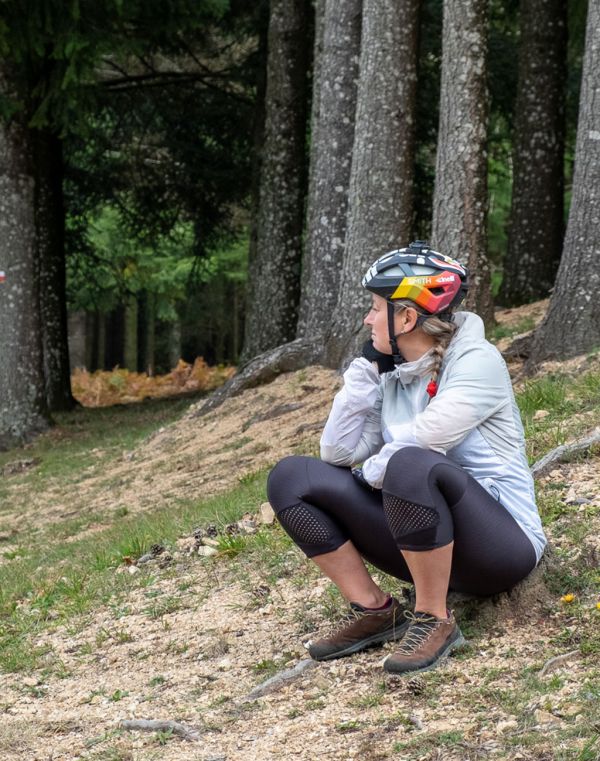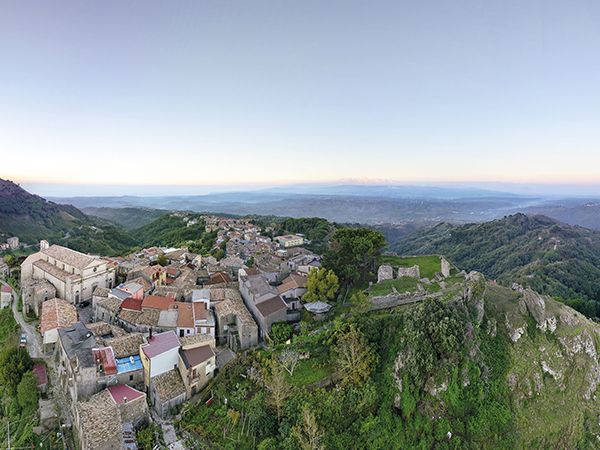
VARIANTE LAGO ANGITOLA
Once past Girifalco, the Ciclovia offers a variant route towards Lake Angitola. We proceed for about 12 km uphill towards Passo Fossa del Lupo (878 m), where we take the SP145 towards Polia. After the first kilometre uphill, the road opens up to a descent with considerable gradients that in the locality of Tre Croci touch 20%. Having reached Polia, we plunge into a magnificent landscape rich in springs and dense vegetation that in the hilly part gives way to olive trees, vineyards and prickly pears. After passing the hamlet of Menniti (400 m), the cycle route proceeds along SP40 with short ups and downs in the direction of Monterosso Calabro (310 m), which is reached at km 21.6. The town, among the twenty most beautiful villages in Italy according to Skyscanner, offers an interesting Museum of Calabria's rural and artisan civilisation together with a multimedia museum of the Calabrian Serre. Downstream from Monterosso, the variant of the cycle route takes the SP47 in the direction of Lake Angitola, a natural oasis of international value located at kilometre 27; the reserve has a charming cycle/pedestrian path and is only 5 km from the beaches of Pizzo Calabro. From here we resume cycling slightly uphill for 14 km to S. Nicola da Crissa (518 m), the 'balcony of Calabrie' that offers a magnificent view of the Tyrrhenian coast. After passing the town, the cycle route resumes its ascent towards Torre di Ruggiero (590 m), which it reaches at Km 56.
ITINERARY AND DESTINATIONS
download GPX | Route with gentle gradient
Places you must visit

MUSEO DELLE SERRE
In Monterosso you will also be able to visit a multimedia museum called “Museo Multimediale delle Serre Calabresi”, where you can see historical photographs of the flora and fauna, the territory, urban planning, architecture; and information about the society, work, food and the dialect.

MONTEROSSO CALABRO
The name Monterosso derives from the ferruginous mine that was used to dye fabrics. There is an important museum dedicated to farming life (with 3000 items) that has created a link between the culture of our ancestors and younger generations.

Angitola LAKE
The natural oasis of Lake Angitola is one of the Mediterranean’s most important natural reserves on an artificial lake. In 1966 the lake was created on the old bed of the Angitola River and from the Nia and Reschia streams. It was declared an oasis and protected by Italian decree D.P.G.R. n. 557 of May 12, 1975. This is the only Ramsar area, a wetland of International importance, in the Calabria region.
KEY FACTS
climate
During the winter season, snowfall may occur on the short high-altitude sections of the Variante. In summer, it is advisable to avoid travelling along the stretch from Lake Angitola to Torre di Ruggiero during the hottest hours of the day.
Food, drink and accommodation
In the villages you pass through along the way, where you can get water at public fountains, you will come across restaurants and trattorias offering local products and typical cuisine.
Clothing
-
It is recommended to use a bike suitable for long distances, a gravel or mountain bike, also with pedal assistance. It may be appropriate to fit off-road (or mixed) tyres in the case of gravel. Although the route is on asphalt, it is a good idea to provide a set-up that allows you to safely tackle sections in the woods that may have mud and gravel in bad weather.
-
If you want to travel with a tent, you can stay in tent camping sites or campsites, agritourism and bivouac areas. To learn more please visit the Parks’ websites.






